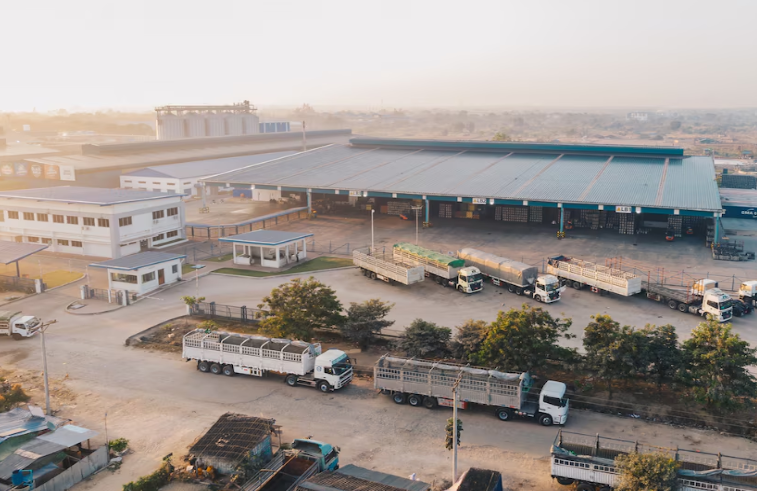In the fast-moving distribution industry, staying competitive demands more than efficient inventory management and order processing.
It demands a comprehensive, all-in-one system that seamlessly connects every aspect of your business, from intricate supply chain management to detailed financial oversight.
NetSuite stands out as a robust ERP solution specifically tailored for distribution companies. It enables them to streamline their operations and significantly boost overall efficiency.
By offering real-time data and a suite of integrated tools, NetSuite ensures that your business continues to run smoothly, regardless of how complex or multifaceted your operations may become.
However, implementing such a complex system can be challenging without the right expertise and guidance; this is where Cumula 3 Group (C3) plays a crucial role.
As a trusted and experienced NetSuite partner, C3 possesses the in-depth knowledge and hands-on experience needed to guide your business through a seamless and successful implementation and ensure that you fully leverage your investment in NetSuite.
Running a distribution business? Start with a pricing estimate and let Cumula 3 Group help you streamline operations and improve efficiency.
ALSO READ:
→ Essential NetSuite Features Every Retailer Should Know
→ Choosing Between NetSuite and Business Central: A Detailed Comparison
Understanding NetSuite ERP for Distribution
NetSuite ERP is a cloud-based system that centralizes all key business operations, offering a cohesive approach to managing distribution processes.
This integration allows companies to oversee inventory, orders, financials, and customer relationships from a single platform, reducing the complexity of juggling multiple systems.
Benefits of a Unified ERP System:
- Eliminating Data Silos for Better Decision-Making: NetSuite’s unified approach removes the issue of data silos, where information is stored in separate, disconnected systems. By consolidating data into a single source of truth, companies can access comprehensive insights, making it easier to make informed decisions that drive business growth.
- Real-Time Data for Proactive Management: With real-time data available at their fingertips, distribution companies can quickly respond to changes in demand, supply chain disruptions, or inventory fluctuations. This capability ensures businesses maintain optimal stock levels and keep operations running smoothly across all locations.
- Supporting Multi-Location Management: NetSuite’s ERP system is designed to handle the complexities of managing inventory and operations across multiple locations. Whether a business operates from a single warehouse or multiple distribution centers, NetSuite provides the tools to maintain accurate inventory levels and streamline distribution activities.
- Facilitating Growth and Scalability: As distribution businesses grow, the need for a scalable system becomes critical. NetSuite’s cloud-based nature allows for easy scaling, adding new features and modules as the business expands, ensuring that the ERP system grows in tandem with the company’s needs.
NetSuite’s integrated platform translates into better control over critical functions for distribution companies.
Businesses can streamline operations by managing everything from inventory to the supply chain within a unified system, improving overall efficiency and reducing the risk of errors.
ALSO READ:
→ NetSuite vs Salesforce: A Detailed Comparison
→ Comparing NetSuite and Acumatica: A Complete ERP Guide for Businesses
5 Key Features of NetSuite for Distribution
Managing a distribution business requires tools that can precisely handle the complexities of inventory, orders, and the supply chain.
NetSuite offers a suite of features specifically designed to meet these needs, helping businesses operate more efficiently and effectively.
Here are five essential features of NetSuite for distribution that can transform your operations:
1. Inventory Management
NetSuite offers real-time tracking and multi-location management, ensuring accurate stock levels and reducing the risks of overstocking or stockouts.
Demand planning tools help optimize inventory, keeping the supply chain running smoothly.
| Feature | Description | Benefits |
| Real-Time Tracking | Monitors inventory levels in real-time across all locations, providing up-to-date stock information. | Ensures accurate inventory levels, reducing the chances of stockouts or overstocking. |
| Multi-Location Management | Manages inventory across multiple warehouses or stores from a single platform, consolidating stock data. | It simplifies inventory management, making overseeing stock levels in various locations easier. |
| Demand Planning Tools | Forecasts demand to optimize inventory levels, ensuring that stock matches customer needs. | Reduces excess inventory and minimizes stockouts, improving supply chain efficiency. |
| Automated Replenishment | Automatically triggers reorders based on predefined stock levels, ensuring continuous supply. | Keeps inventory levels optimal, reducing manual intervention and preventing stock shortages. |
| Lot and Serial Number Tracking | Tracks inventory by lot and serial numbers, enabling detailed tracking of items throughout their lifecycle. | Enhances traceability, ensuring compliance and improving product recall processes if needed. |
With automated replenishment, NetSuite ensures that inventory levels are maintained efficiently without manual intervention.
2. Order Management
NetSuite’s automated order processing streamlines the order-to-cash cycle, significantly reducing errors and speeding up fulfillment.
It integrates seamlessly with various sales channels, allowing businesses to manage orders from online stores, wholesale, and retail outlets in one system.
| Feature | Description | Benefits |
| Automated Order Processing | Streamlines the order-to-cash cycle by automating order entry, invoicing, and payment collection. | Reduces manual errors, speeds up order fulfillment, and improves cash flow management. |
| Multi-Channel Sales Integration | Integrates orders from various sales channels, including eCommerce, wholesale, and retail, into one system. | Simplifies order management by consolidating all sales channels, improving efficiency and consistency. |
| Real-Time Order Tracking | Provides up-to-the-minute status updates on orders, from placement to delivery. | Enhances customer satisfaction by offering transparency and timely updates on order status. |
| Flexible Fulfillment Options | Supports various fulfillment methods such as drop shipping, direct shipping, or in-store pickup. | Increases customer convenience and satisfaction by offering multiple delivery and pickup options. |
| Returns Management | Automates the returns process, including tracking, processing, and refunding returns and exchanges. | Simplifies and speeds up the handling of returns, improving customer experience and operational efficiency. |
This feature improves customer satisfaction by ensuring that orders are processed quickly and accurately.
3. Supply Chain Management
NetSuite offers end-to-end visibility into the supply chain, covering everything from vendor management to procurement and the real-time tracking of goods.
This visibility allows businesses to manage their supply chain more efficiently, ensuring timely deliveries and minimizing disruptions.
| Feature | Description | Benefits |
| End-to-End Visibility | Provides a comprehensive view of the entire supply chain, from procurement to delivery. | Enhances decision-making by offering a clear understanding of every stage in the supply chain process. |
| Vendor Management | Facilitates effective communication and collaboration with suppliers, including tracking performance and compliance. | Strengthens supplier relationships, improves procurement efficiency, and reduces risks. |
| Procurement Automation | Automates purchasing processes, including order placement, approvals, and inventory replenishment. | Reduces manual workload, speeds up procurement cycles, and ensures timely restocking. |
| Real-Time Tracking of Goods | Tracks the movement of goods in real-time from suppliers to customers, ensuring transparency and accuracy. | Increases operational efficiency by allowing proactive management of supply chain activities. |
| Supply Chain Collaboration | Enables real-time collaboration between all supply chain stakeholders, including suppliers, manufacturers, and distributors. | Improves coordination, reduces delays, and enhances overall supply chain agility. |
With automated procurement processes, NetSuite helps maintain strong relationships with suppliers and ensures consistent supply flow.
4. Financial Management
NetSuite’s financial management tools provide real-time insights into a company’s financial health, integrating accounting with other business processes for seamless financial oversight.
It simplifies invoicing, revenue recognition, and financial reporting, enabling businesses to manage their finances more effectively.
| Feature | Description | Benefits |
| Real-Time Financial Reporting | Provides up-to-the-minute financial reports, including balance sheets, income statements, and cash flow analysis. | Enables informed decision-making by offering accurate and current financial insights. |
| Integrated Accounting | Links accounting processes with other business operations, such as sales, inventory, and procurement. | Streamlines financial management, reduces manual data entry, and ensures consistency across the business. |
| Automated Invoicing | Automates the creation, distribution, and tracking of invoices, ensuring timely billing and payment collection. | Improves cash flow management and reduces the risk of errors in billing and payments. |
| Revenue Recognition Compliance | Ensures that revenue is recognized according to applicable accounting standards, such as ASC 606. | Helps businesses stay compliant with financial regulations, reducing the risk of penalties and fines. |
| Budgeting and Forecasting | Offers tools for creating and managing budgets, as well as forecasting future financial performance. | Enhances financial planning, helping businesses allocate resources effectively and anticipate future needs. |
This feature ensures that businesses have accurate, up-to-date financial data to make informed decisions.
5. Business Intelligence and Reporting
NetSuite’s advanced reporting capabilities allow distribution companies to monitor key performance indicators (KPIs) and generate detailed reports on all aspects of their business.
These insights help businesses make data-driven decisions that enhance operational efficiency and drive growth.
| Feature | Description | Benefits |
| Automated Order Processing | Streamlines the order-to-cash cycle by automating order entry, invoicing, and payment collection. | Reduces manual errors, speeds up order fulfillment, and improves cash flow management. |
| Multi-Channel Sales Integration | Integrates orders from various sales channels, including eCommerce, wholesale, and retail, into one system. | Simplifies order management by consolidating all sales channels, improving efficiency and consistency. |
| Real-Time Order Tracking | Provides up-to-the-minute status updates on orders, from placement to delivery. | Enhances customer satisfaction by offering transparency and timely updates on order status. |
| Flexible Fulfillment Options | Supports various fulfillment methods such as drop shipping, direct shipping, or in-store pickup. | Increases customer convenience and satisfaction by offering multiple delivery and pickup options. |
| Returns Management | Automates the returns process, including tracking, processing, and refunding returns and exchanges. | Simplifies and speeds up the handling of returns, improving customer experience and operational efficiency. |
By analyzing trends and performance metrics, companies can identify opportunities for improvement and adjust strategies accordingly.
These five key features of NetSuite for Distribution provide the essential tools needed to optimize your operations and maintain a competitive edge in the industry.
Implementing these features will enable your business to streamline processes, enhance decision-making with real-time data, and ultimately drive long-term success and profitability.
ALSO READ:
→ Choosing Between NetSuite and Epicor: Which ERP Fits Your Needs?
→ How AI is Shaping the Future of Cloud ERP
Evaluating NetSuite vs. Other ERP Options for Distribution Businesses
When evaluating ERP solutions for your distribution business, NetSuite consistently stands out for its comprehensive and user-friendly features.
While other solutions like SAP Business One and Microsoft Dynamics 365 offer strong capabilities, NetSuite’s all-in-one approach and real-time data integration give it a clear edge in streamlining distribution operations.
Here’s a table comparing NetSuite with other Distribution ERP Solutions:
| Feature | NetSuite | SAP Business One | Microsoft Dynamics 365 |
| Inventory Management | Real-time tracking, multi-location management, advanced demand planning, and automated replenishment. | Strong inventory tracking, batch/serial management, basic demand planning, and warehouse management. | Real-time inventory updates, advanced warehouse management, multi-location tracking, but limited demand planning. |
| Order Management | Automated order processing, seamless multi-channel integration, real-time tracking, and flexible fulfillment options. | Order processing with strong B2B and B2C capabilities, multi-channel support, and batch processing. | Advanced order management with CRM integration, robust multi-channel support, and customer-specific pricing. |
| Supply Chain Management | End-to-end visibility, vendor management, automated procurement, and real-time goods tracking for superior efficiency. | Comprehensive supply chain management, procurement integration, and strong vendor collaboration tools. | Strong supply chain visibility, integrated with procurement, logistics, and real-time tracking features. |
| Financial Management | Real-time financial reporting, fully integrated accounting, automated invoicing, and advanced revenue recognition compliance. | Integrated financial management, multi-currency support, automated invoicing, and basic compliance tools. | Advanced financial reporting, integrated with accounting and HR, strong multi-currency support, and compliance features. |
| Business Intelligence and Reporting | Customizable dashboards, advanced real-time analytics, automated report scheduling, and dynamic data visualization. | Advanced reporting capabilities, strong analytics, customizable dashboards, and data warehousing. | Comprehensive BI with AI-driven insights, powerful reporting tools, and data visualization with predictive analytics. |
While SAP Business One and Microsoft Dynamics 365 present solid ERP solutions for distribution, NetSuite’s ability to seamlessly integrate key functions with real-time data makes it a superior choice.
With its robust features designed to optimize every aspect of distribution operations, NetSuite not only meets but exceeds the needs of growing businesses, making it the ideal choice for those seeking to maximize efficiency and profitability.
ALSO READ:
→ NetSuite Alternatives: Delving into 15 ERP Options
→ Cumula 3 Group Named in Accounting Today’s VAR 100 List for 2023
Implementation Best Practices
Successfully implementing NetSuite in your distribution business is a critical step toward optimizing your operations and driving future growth.
It’s essential to approach the implementation process with careful planning and strategic execution to ensure a seamless transition.
These best practices will be able to maximize the benefits of NetSuite:
- Initial Assessment and Goal Setting: Begin by thoroughly assessing your current operations to identify areas that need improvement and opportunities for optimization. Clearly define the goals you want to achieve with NetSuite, such as streamlining processes, improving data accuracy, or enhancing customer service. This step ensures that the implementation aligns with your business objectives and sets a clear direction for the project.
- Data Migration and System Integration Planning: Plan the data migration process carefully to ensure all necessary information is accurately transferred to NetSuite. Clean and organize your data before migration to avoid issues disrupting your operations. Additionally, develop a strategy for integrating NetSuite with your existing systems to maintain business continuity and ensure a seamless transition.
- Customization and Configuration: Customize NetSuite to fit the specific needs of your distribution business. This may involve configuring workflows, setting up roles and permissions, and adjusting system settings to match your business processes. Proper customization ensures that NetSuite works efficiently for your team and addresses the unique challenges of your operations.
- Training and Change Management: Invest in comprehensive training for your team to ensure they are comfortable using NetSuite from day one. Effective training is crucial for maximizing user adoption and minimizing disruptions during the transition. Additionally, manage the change process by keeping your team informed, addressing concerns, and providing ongoing support to help them adapt to the new system.
- Continuous Monitoring and Optimization: After the implementation, continuously monitor NetSuite’s performance to ensure it meets your business needs. Collect feedback from users and make adjustments as necessary to optimize the system’s functionality. Regularly reviewing and fine-tuning NetSuite will help you fully leverage its capabilities and keep your operations running smoothly as your business evolves.
A well-executed NetSuite implementation helps you avoid common pitfalls and lays a strong foundation for your business to thrive in a competitive market.
With the right preparation and approach, your team will be fully equipped to leverage NetSuite’s powerful features, enhancing efficiency and supporting sustainable growth for years to come.
At Cumula 3, our experienced team is committed to making your NetSuite implementation seamless, helping you unlock its full potential to drive long-term success in your distribution operations.
ALSO READ:
→ NetSuite Implementation Expenses Unveiled: Finding Your ERP Fit
→ Simplified NetSuite: Add-Ons for Improved Functionality
Conclusion – NetSuite for Distribution
Selecting the right ERP solution is essential for enhancing efficiency and fostering growth within your distribution business.
NetSuite provides a robust and comprehensive platform specifically tailored to address the unique challenges of managing inventory, processing orders, overseeing supply chains, and handling financials.
Its integrated features seamlessly streamline your operations, offering you greater control and visibility over every critical aspect of your business.
However, the success of this transition depends heavily on meticulous planning, thoughtful customization, and ensuring that your team is fully equipped to utilize the system effectively.
Cumula 3 Group offers the expertise and guidance necessary to navigate this complex process, helping you implement NetSuite to maximize its potential.
By partnering with C3, you can confidently avoid pitfalls often accompanying ERP implementations, ensuring that your business is strategically positioned for long-term success.
NetSuite’s extensive capabilities have the power to significantly transform your operations, providing the tools you need to run a more efficient and profitable enterprise.
Ready to modernize your distribution workflows? Begin with tailored pricing insights from Cumula 3 Group and map out your next steps.






